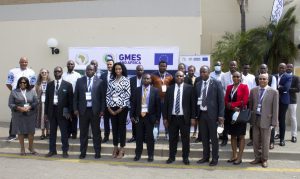
GMES & Africa Programme Coordinator Dr Tidiane Quattara and SASSCAL Executive Director Dr Jane Olwoch flanked by Workshop Delegates
The Southern African Science Service Centre for Climate Change and Adaptive Land Management (SASSCAL) in collaboration with the Council for Scientific and Industrial Research (CSIR) held a fruitful Hybrid GMES and Africa Regional workshop from 27 – 29 September 2021, at Safari Hotel in Windhoek, Namibia.
The workshop became a significant platform to promote and encourage mutual exchange of information, best practices, knowledge and experiences in relation to new and innovative Earth Observation technologies developed under the GMES & Africa’s programme.
The workshop also unpacked trends in the use of earth observation data to monitor and assess wetland conditions, threats to sustainable utilisation of wetland resources as well as updating stakeholders on how climate change variability and drought is continually affecting Sub-Saharan Africa’s surface water resources.
Addressing the delegates during the workshop proceedings, Dr. Tidiane Ouattara the GMES and Africa Coordinator in the African Union Commission spoke on the primary duty to consolidate the gains made by GMES and Africa on Earth Observation technologies. He stressed on the importance of promoting cross fertilization of ideas and innovation amongst consortia, facilitating easier access to data, and expanding the space for the private sector’s participation. He further said that it is equally important that consortia work on improving results by making training more relevant, effective and inclusive, and by ensuring deeper communication and engagement with end users.
The African Union Commission commended the consortia of African institutions that constitute GMES and Africa, including SASSCAL and CSIR, for the joint partnerships and collaboration in delivering services and solutions very much in need by African communities.
“I assure you that the Commission is committed to continually facilitating avenues for collaboration and performance by African institutions as mandated by African Union Member States. Moving on to GMES and Africa phase 2, the Commission underlines renewed standards of collaboration and implementation, including sustainable resourcing models for the continued relevance of GMES and Africa projects. Experience from the first chapter dictates that we calibrate our management methods, especially monitoring and reporting requirements, for efficiency and timely delivery and also Phase 2 will in no doubt place optimum emphasis on cross fertilization and harmonization of efforts within, between and amongst consortia, and it will involve the crystallization of the role and contributions of academia and the private sector” said Dr. Ouattara. He also highlighted that in conjunction with the objectives of the African Space Policy and Strategy and the aspirations under Agenda 2063, gender mainstreaming and youth participation will form key priorities in future implementation of GMES and Africa.
Ministry of Agriculture Water and Land Reform, Deputy Executive Director, Dr Eric Ndala commenting during the opening remarks of the workshop, pointed to climate change as an obstacle getting in the way of implementing National development plans aimed at the realization of the Millennium Development Goals and Sustainable Development Goals. He stressed that for instance, Namibia, the region, its people and its natural resources are extremely vulnerable to predicted impacts of climate change. It is also apparent that although some efforts are underway to test adaptation approaches and understand the impacts of climate change better, Namibia as well as the entire region needs to be thoroughly prepared in the short, medium and long term.
Dr. Ndala says that, “Given the reliance of the majority of the population on climate-sensitive sectors such as agriculture, biodiversity, wood and forestry, and the potential impacts of these changes could be catastrophic for our people. In addition, climate change will bring a host of new challenges and opportunities for which we need to be thoroughly prepared”
SASSCAL’s Board Chair, Mrs Jane Chinkusu put on the spotlight how Africa and the world at large is witnessing several threats on the wetlands ecosystems and yet wetlands provide many benefits to society. She said that investing in research to restore their integrity will yield positive and sustainable impact.
Mrs Chinkusu hailed the efforts of long term cooperation between the African union and European Union in making projects such as these a reality . She said that their cooperation and funding to SASSCAL is instrumental in bringing numerous space assets to the societies in the region. I wish therefore to thank both the AU and EU for their vision.
“I wish to challenge SASSCAL, CSIR and members of their consortia to go beyond scientific publications and invest in products and services for decision making, upliftment of our urban and rural communities and thereby making a contribution to the realization of Agenda 2063 – The Africa we Want” says Ms Chinkusu.
The GMES and Africa Workshop was attended by a broader pool of international delegates from the two continents (Europe and Africa) both physically and virtual. This included the member countries policy makers, line ministers from the SADC countries, public and private sector stakeholders, implementers, Basin Commissions, researchers, and any other stakeholders whose activities are related to coastal areas, rivers, and their ecosystems.
In her remarks, SASSCAL Executive Director Dr Jane Olwoch contended that the world is currently confronted with several big challenges such as long-term climate change and COVID-19. Human beings are adaptable and have adapted to different challenges in the past. Cooperation between different regions and continents is paramount to sustained adaptation. Free and open data access as the one provide by the Copernicus programme is an important output of the AU and EU cooperation that enables continuous environmental monitoring.




